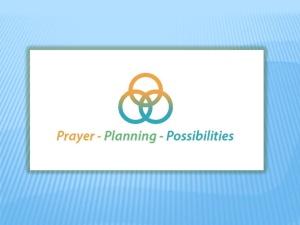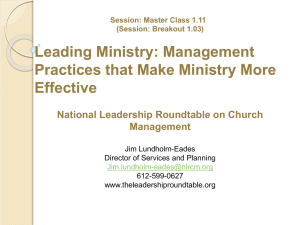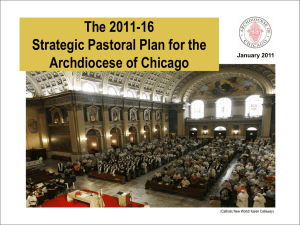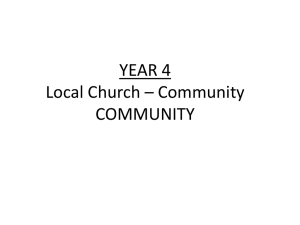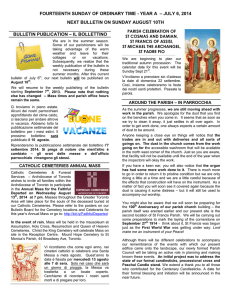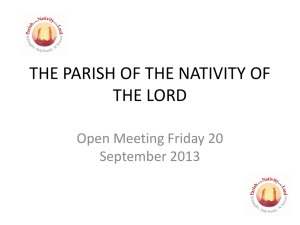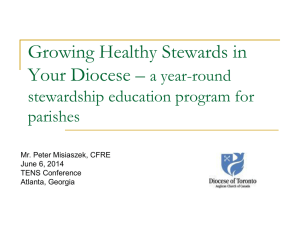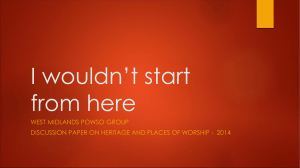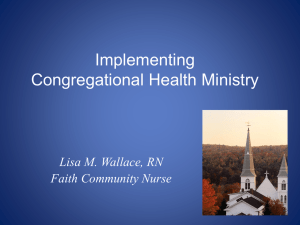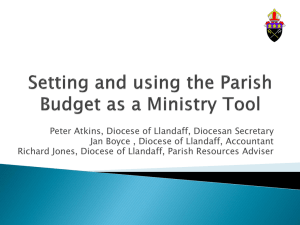DPC Focus Session Powerpoint - Roman Catholic Diocese of
advertisement
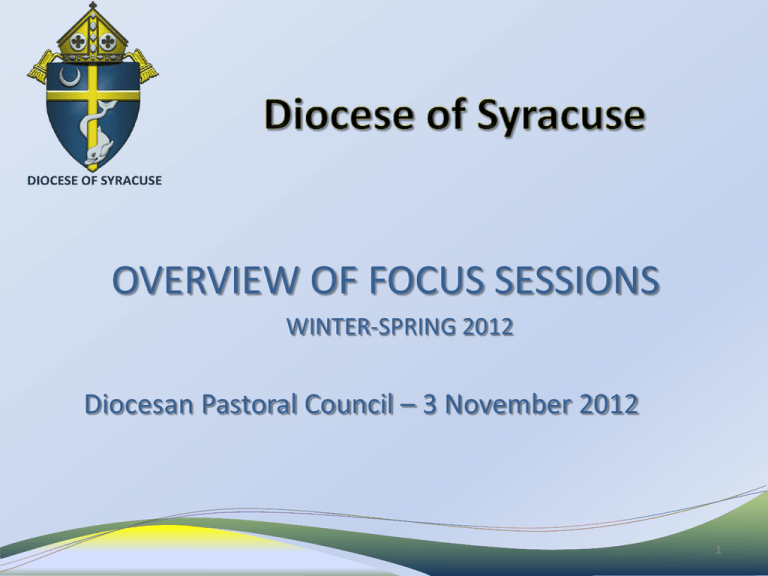
OVERVIEW OF FOCUS SESSIONS WINTER-SPRING 2012 Diocesan Pastoral Council – 3 November 2012 1 • Demographics and Resources in our 7 counties –Population –Mass Attendance –Religious Practice of Catholics –Diminishing number of Priests, Religious and Lay Ministers –Change in Cultural Climate about Religion 2 • 150 Sessions held throughout the diocese. • Sessions were held for priests, religious, seminarians, faith formation directors, parish ministry staffs, parish trustees and parish pastoral council officers. • The included a presentation of the data and opportunities for discussions and recommendations. 3 • The sessions were characterized by candor, faith, and the desire to maintain dynamic Catholic Communities. • We wish that more people had been present because the quality of the dialogue demonstrated a rich sense of faith. 4 • Some expressed concern that pastors may lack the energy, skills and willingness to embrace the next steps in the process. • People are proud of what they and the diocese has done to date in moving forward. • Most people know that the process is not complete. 5 • There is a clear need for training and mentoring in new leadership styles. • Previous emphasis on parochial identity has hindered collaboration in some areas. • We need to focus on “Community Centered Parishes” rather than “Pastor Centered Parishes” 6 • People love their priests, yet hope that they will be trained and mentored as new leadership styles emerge. • Reconfiguration is a work in progress. The pace of Change will increase. • Parochialism challenges needed Clustering • Grow into a Community Centered Parish served by a Priest and Team 7 • New Leadership styles are an evolving reality. • Canon Law provides a Bishop options in shaping the parishes of his diocese. • Practical implications of new models • The question of Sustainability. • Acknowledging history and entrusting the future to God. 8 • The need for training in collaborative ministry • CARA Studies on recently Ordained Priest and Parishes. www.cara.georgetown.edu • The Emerging Models of Ministry Project – www.emergingmodels.org • The Evolving roles of the Permanent Diaconate • Co-Workers in the Vineyard of The Lord- USCCB 2005 9 • New types of Lay Ministries, including Parish Life Coordinators and Cluster Teams • Human Resource issues that come with new leadership styles. • A fuller role for parish business managers and parish finance councils in assisting pastors. 10 • What does the cluster model look like and how is it experienced at the lived level. • The Emerging Models MPP & MPM Studies – reflect a variety of leadership styles (Mogilka) • Embracing Pastoral Creativity & Evolving a local vision (with Parish Pastoral Council). 11 • The future parish will be: • Mission Focused • Adaptive • Collaborative • The situation of each parish will be ‘customized’ to fit the needs of the area. 12 • The current demographic contains an urgent need to identify, recruit, train, mentor, resource, and place new leaders at all levels. • Participants strongly urged consistency in parish application of diocesan program and sacramental polices. This will allow parishes to cluster or combine more easily. 13 • Capture the essentials: – Enable Priests to focus on Spiritual Leadership and the faith formation of parishes. – COMMUNICATION SYSTEMS [at all levels] – HOSPITALITY; Welcome to parish family & others. – EVANGELIZATION AS A LIFESTYLE – Family, Youth and Young Adult Ministries – Focus on developing new professionals 14 • Encourage strategic alliances by: – Enhancing and Promoting Inter-Parochial Collaboration and Sharing. – Diocesan development of Staffing models, Leadership selection, formation – training – mentoring programs & policy. – Assist parishes in improving resources and patterns of sustainability. 15 • RE-ALIGN PASTORAL CARE AREAS TO PROMOTE: – Inter-parochial collaboration and sharing – To enable future Inter-Parish Staffing, linkage, or Clustering as the care for the people of the diocese remains a core concern. – Bring resources to the development of longrange parish sustainability & fiscal liquidity. 16 • The Diocese will provide guidance in naming, and guiding the application of Canonical Models as we move into the future. 17 • DEVELOP & IMPLEMENT A RENEWED PASTORAL PLANNING COMMUNICATION PLAN. – Include: • Homily Time Video Presentations • Models for Parish Town Hall Meetings • Training for Priests & Parish Staffs 18 • Pastoral Communication Plan, continued – Training for Parish Pastoral Councils, Parish Finance Councils, Parish Business Managers to enhance “Mission Focused Parishes.” – Encourage use of the Appreciative Inquiry Model. – Catholic Sun series on the evolving future – Public Media Orientation [Radio, T.V., the Press, etc.] for the continuing planning process. 19 • Identify, mentor, and collaborate with parishes as they enter the clustering process. [Note: These models may will be a significant shift in the Northeast and Mid-Atlantic States, However, they are in wide use throughout the U.S.A., Canada, and on other continents.] 20 • PROVIDE SPECIALIZED TRAINING TO PRIESTS/PASTORS, PARTICULARLY TO THOSE UNDER AGE 65. 21 • There is a concern about limited financial resources and the best ways to use these resources for the future. The Increase Offering Campaign was very helpful to parishes. Continued collaboration with the diocese regarding these issues is essential. 22 • CONTINUE TO REVIEW THE FLEXIBILITY AND RESPONSIVENESS OF DIOCESAN PRIEST PERSONNEL POLICIES [appointment, term, and tenure) FOR THE EVOLVING NEEDS FOR THE PASTORAL CARE OF THE ENTIRE DIOCESE. 23 • REVIEW THE FLEXIBILITY AND VIBRANCY OF THE DEACON PERSONNEL POLICIES AND THE MODELS BY WHICH THESE POLICIES SUPPORT DIOCESAN PAROCHIAL MINISTRY. 24 • THE DIOCESE WILL PROVIDE GUIDANCE FOR THE RECRUITMENT, SELECTION, ROLE SPECIFICATION, HUMAN RESOURCE EXPECTATIONS, TRAINING, EMPLOYMENT AND DEPLOYMENT OF NEW PARISH BASED “MINISTERIAL” LEADERSHIP. 25 • PROMOTE AND ENHANCE ACCESS TO THEOLOGICAL FORMATION AND CONTINUING EDUCATION AT: – – – – – – – ST. BERNARD’S SCHOOL OF THEOLOGY AND MINISTRY THE LIMEX PROGRAM LE MOYNE COLLEGE THE PERMANENT DIACONATE PROGRAM THE FORMATION FOR MINISTRY PROGRAM CATECHETICAL FORMATION PARISH BASED ADULT EDUCATION 26 • IMPLEMENT AND PROMOTE THE NEW EVANGELIZATION AT ALL LEVELS 27 • ENABLE PARISHES TO FOCUS ON DEVELOPING MINISTRIES OF HOSPITALITY & WELCOMING 28 • What barriers prevent your parish from being mission focused? • List 3-5 strategies that will help your parish to reach its goals? • What steps should your parish and Pastoral Care Area take to strengthen parish life between now and 2017? 2020? 29 • Brother Ed and Father Jim are always available to work with parishes and pastoral care areas as the plan for the future. Father Jim Lang – Vicar for Parishes – 315-470-1437 Brother Ed Falsey – Associate Director for Pastoral Planning – 315-470-1430 30 • The Diocese of Syracuse 240 East Onondaga Street Syracuse, New York 13202 • Fax: 315-478-4619 • E-mail: jlang@syrdio.org or efalsey@syrdio.org 31 32 Peace and Good things! St. Marianne Cope, Pray for us! St. Kateri Tekakwitha, Pray for us! 33

